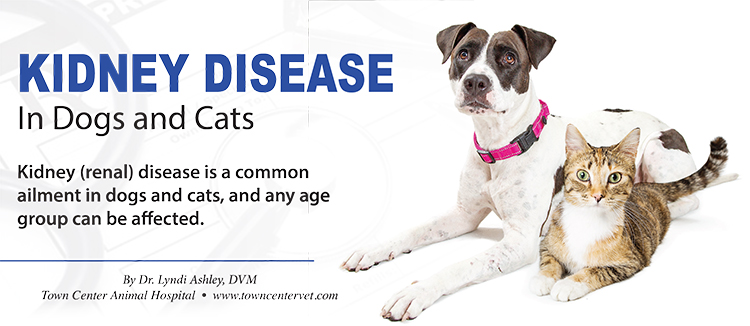
What is kidney disease?
Any disease process, acute or chronic, that prevents the kidneys from functioning properly. Every wonder what the kidneys do? Well, the kidneys have multiple jobs, but their primary and most important role is to filter the blood and remove toxins.
What are the most common causes of kidney disease?
Before discussing, it is important to understand the difference between acute and chronic kidney disease. In acute cases, the onset is sudden and clinical signs are usually more severe, since blood toxins build up quickly. In chronic cases, the disease usually progresses slowly and clinical signs may go unnoticed for months.
Most common causes of acute kidney disease are ingestion of toxins such as certain foods or plants. For example, raisins and grapes can be extremely toxic to dogs. In cats, ingestion of lilies can cause kidney failure and even death. Other causes of acute kidney disease include infectious causes, such as leptospirosis, lyme disease and pyelonephritis. Leptospirosis is a bacterial infection usually spread by infected wildlife and concentrated in areas with rivers, lakes and/or streams. Leptospirosis is not common in Nevada. Lyme disease is transmitted by ticks, this is why tick prevention is important in areas where tick burdens are high. Pyelonephritis occurs secondary to a lower urinary tract infection, when bacteria ascend up into the kidneys, causing sudden and often severe illness.
Chronic kidney disease usually occurs over a long period of time. In many patients with chronic disease, the underlying cause may not be determined. Chronic kidney disease is more common in aging dogs and cats.
What are signs of kidney disease?
During the early stages of kidney disease, the signs are usually non specific, such as increased thirst and urination, and decreased appetite. In acute cases, or when the disease process progresses, you may notice vomiting, lethargy and weight loss.
How do you diagnose kidney disease?
Since chronic kidney disease may go unnoticed, it is important to include annual veterinarian care. IF your pet is over 7 years of age, it is recommended to have routine check-ups every 6 months. Your veterinarian may perform a physical exam, complete blood profile, and urinalysis. In addition, imaging, such as radiographs (x-rays) and ultrasound of the kidneys may be performed. However,
many tests may be normal in early stages of kidney disease. A newer blood test, called SDMA is now routinely used
to aid in earlier detection of kidney disease.
What are treatment options?
The mainstay in treating kidney disease, is good hydration and dietary modification. If an underlying cause is determined, other treatments may be used. Occasionally, your pet may need hospitalization for more intensive care.
If you think your pet is showing clinical signs of kidney disease, please schedule an appointment with your veterinarian.
Dr. Lyndi Ashley joined Town Center Animal Hospital in 2017. She completed her undergraduate studies in 2012 and received her Doctorate of Veterinary Medicine in May 2017 from Louisiana State University. Her professional interests include feline medicine, dermatology, and oncology. www.towncentervet.com
